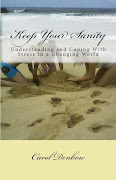Healthy food and beverages help keep our entire system in balance. When our body is balanced, we are less stressed.
*Overeating reduces energy levels. Eat smaller portions of food more times per day rather than indulging a lot of food until you feel stuffed.
*Make fruits and vegetables part of your snack food instead of chips or cookies. Fresh fruit is a good source of energy, and apples and bananas are considered brain foods. Oranges or natural orange juice are full of necessary vitamins needed to boost your immune system.
*Sugary foods may give you a quick burst of energy, but they can also increase irritability or fatigue. It is also possible that too many sweets can induce diabetes in susceptible people, not to mention an increase in fat cells, potentially causing obesity.
*Studies have shown an occasional feast of an all-carbohydrate meal, including foods such as pasta, whole-grain breads, rice, oatmeal, and even popcorn, may help release a brain chemical called “serotonin,” which can induce a sense of calm.
*Vitamin B is needed for your body to produce serotonin. Include foods in your diet rich in B vitamins, most importantly B6 and B12. Your best sources for Vitamin B6 are potatoes, bananas, and beans, while fish, chicken, turkey, and dairy foods are your best bet for Vitamin B12.
*Dairy products such as milk and yogurt may help increase memory function in stressful situations. It is also important to drink at least four eight-ounce glasses of water every day. Water cleanses the body throughout.
*Alcoholic beverages won’t generally harm you in moderation. Many Europeans believe that wine is healthy. In fact, at times, wine is part of the meal, even for children. Most social drinkers say that an alcoholic beverage relaxes them and decreases stress. But alcohol in excess (two drinks a day or more) can go beyond relaxation and cause depression, anxiousness, and clouded thinking. It can also lead to alcoholism and other life-threatening illnesses.
Monitoring your food and beverage intake may reduce the symptoms of stress, but not the stress issue itself. Take action to resolve the problems that initially caused you the stress.
After surviving a stress-related and life-threatening auto-immune disorder, author Carol Denbow realized the need for public knowledge on the importance of understanding and relieving stress was great, thus setting the path for her third book, “Stress Relief for the Working Stiff, How to Reverse the Embalming Effect.” Meet “Frank,” the “star” of this book at Carol’s website at http://www.BooksByDenbow.Weebly.com/stress-books.html
Thursday, August 14, 2008
Useful Tips to Eat, Drink, and Be Stress Free
Subscribe to:
Post Comments (Atom)


1 comment:
Thanks for great information you write it very clean. I am very lucky to get this tips from you
Stress Relief
Post a Comment